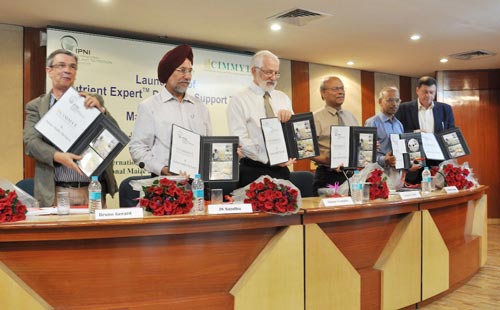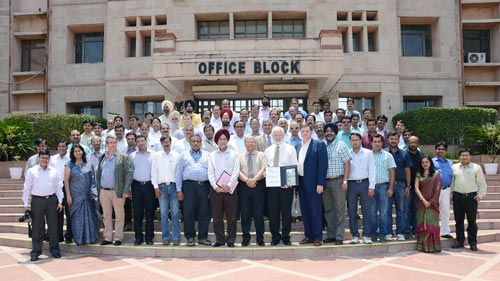 The Nutrient Expert™ decision support tools for maize and wheat in India were officially launched for public use on 20 June 2013 at the National Agricultural Science Centre Complex in New Delhi during a meeting jointly organized by the International Plant Nutrition Institute (IPNI) and CIMMYT.
The Nutrient Expert™ decision support tools for maize and wheat in India were officially launched for public use on 20 June 2013 at the National Agricultural Science Centre Complex in New Delhi during a meeting jointly organized by the International Plant Nutrition Institute (IPNI) and CIMMYT.
Beginning in 2009 under the umbrella of the Cereal System Initiative in South Asia (CSISA) and later CRPs MAIZE, WHEAT, and CCAFS, the tools were developed through a joint effort of IPNI, CIMMYT, and national agricultural research systems to help Indian farmers achieve higher yields and profits. These easy-to-use, interactive, computer-based tools capture spatial and temporal variability to provide precise nutrient recommendations to smallholder farmers in the wheat and maize systems of India.
The Nutrient Expert™ was developed in collaboration with target users and local stakeholders from public and private sectors through a series of dialogues and consultations, using site-specific nutrient management principles. As a result, the tools reflect resource constraints of smallholder farmers, lack of access to soil testing, and absence of tillage-specific nutrient management strategies in India. In a three-year validation process assessing their efficacy under contrasting management scenarios, conducted across a large number of locations in collaboration with the Indian Council of Agricultural Research (ICAR), state agricultural universities, state agriculture departments, and fertilizer and seed industries, the tools have shown improved productivity, profitability, efficiency, and reduced environmental footprints over existing fertilizer management practices. According to Bruno Gerard, Global Conservation Agriculture Program director, “the excellent outputs of the IPNI-CIMMYT partnership will benefit not only South Asia but also other regions.” Adding to the positives of the tools, IPNI vice president Adrian M. Johnston praised their unique ability to link databases for output.
The tools were launched at the presence of CIMMYT director general Thomas Lumpkin, ICAR Crop Sciences deputy director general Swapan K. Datta, agricultural commissioner with the Government of India JS Sandhu, Adrian M. Johnston, Bruno Gerard, and ICAR assistant director general for Natural Resource Management B. Moham Kumar. As India faces many challenges to feed its growing population with changing food habits, Lumpkin emphasized the need for new tools: “We need to apply precision agriculture on each square meter; we need tools like the Nutrient Expert™ and remote-sensing technology to be able to do so.”
During panel discussions following the launch, participants stressed the importance of the tools and charted out the future course of action for their large-scale dissemination. “The challenges currently faced by South Asia should be used as an opportunity to create impact. Enabling farmers to apply fertilizer nutrients correctly and in a more precise way is one such opportunity,” said Datta. The Nutrient Expert™ tools will also help reduce the knowledge gap between extension workers and farmers, he added. Concerned about the degradation of natural resources, Kumar stressed that “excessive and imbalanced use of chemicals significantly contributes to nonpoint source pollution. A precise, site-specific nutrient management approach is a welcome solution to this problem.”
The concluding session, chaired by KD Kokate, ICAR deputy director general for extension, and co-chaired by CIMMYT’s Raj Gupta, provided necessary guidance for dissemination throughout the national system and other stakeholders.
The program was coordinated by IPNI-South Asia director Kaushik Majumdar and CIMMYT senior cropping systems agronomist ML Jat.
 Climate adaptation and mitigation
Climate adaptation and mitigation